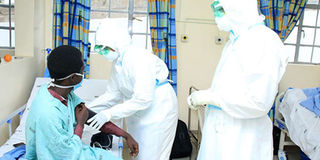More healthcare workers test positive for Covid-19 as ministry slows down testing

Medics attend to a Covid-19 patient at Kenyatta National Hospital in Nairobi on April 17, 2020. PHOTO | JEFF ANGOTE | NATION MEDIA GROUP
What you need to know:
- Failure by the government to continue testing the healthcare workers is a big blow, putting into focus the safety of first-line responders to the scourge.
- According to investigation done by the Saturday Nation, no testing of medics is happening in Nairobi - only the targeted testing for community. In Mombasa, the healthcare workers are tested only on request.
- The available test is for those in isolation and quarantine because there are no kits.
At the least, 80 medics have tested positive across the country in the ongoing fight against the new coronavirus disease even as it emerges that the government is no longer testing the population, the Nation has learnt.
Failure by the government to continue testing the healthcare workers is a big blow, putting into focus the safety of first-line responders to the scourge.
Whereas the Ministry of Health says only 54 healthcare workers have been infected, sources puts the number at 80.
According to investigation done by the Saturday Nation, no testing of medics is happening in Nairobi - only the targeted testing for community. In Mombasa, the healthcare workers are tested only on request. The available test is for those in isolation and quarantine because there are no kits
In Kilifi, the testing for medics is ongoing though materials are unavailable while in Kajiado, they have never started testing medics.
In Kisumu, lack of the materials has also stalled the process and the medics are now worried with the rising number of cases.
“The process started with the nurses at Kenyatta National Hospital and stopped there, we have been struggling to have our people tested. I mean they get their way to be tested,” said George Gibore, secretary-general, Kenya Union of Clinical Officers.
He continued: “The challenge, is that the government is claiming that they are testing healthcare workers, where is the test being done? None of my members have been tested.”
In Nairobi, where the risk is high, majority of them have not been tested.
He said healthcare workers should be screened for Covid-19 every week to protect patients from asymptomatic infection, adding a huge number of patients show few symptoms and very easy for transmission to occur.
“When one of us attends to such patients, they risk getting infected and infecting other patients as well. The only way to curb this, is by having them tested for at least every week moreso those in high-risk areas,”Mr Gibore said.
The government, however, denied claims that they were not testing healthcare workers adding that they test after every two weeks.
“These are very special people. They are normally tested after every two weeks just to ensure they do not infect themselves and their clients as well,” said Dr Rashid Aman, the chief administrative secretary, Ministry of Health.
The reason, he said, they have not been doing vigorous testing in the population is because of the shortage of testing materials that has led to backlog of samples that are yet to be tested.
The ministry is now prioritising testing of truck drivers and those in quarantine centres as it emerges that the government is overwhelmed with more than 5,000 specimens collected two weeks ago still in the queue to be tested for Covid-19.
Kenya relies majorly on test kits donated by the Jack Ma Foundation, sourced via partners including the WHO and procured via a newly created platform that pools African countries' together.
It is only through testing that the country is able to determine how the virus has spread and parts of the country with the highest infection. This will be a key factor to inform how and when to reopen an already battered economy.
In Namanga, a team of clinical officers, nurses, and public health officers manning the Kenya-Tanzania had to placed under quarantine after one of the staffers tested positive. The team of eight port health officers went on quarantine on May 17, forcing the Ministry of Health to redeploy a replacement team, the nation has learnt.
Healthcare workers have been praised as heroes and heroines for their personal sacrifices in the face of the highly infectious disease that has seen doctors and nurses scramble to save the lives of thousands of patients. Doctors, clinical officers, and nurses, like their colleagues in other parts of the world, have had to grapple with a shortage of personal protective equipment (PPEs) and long work shifts.
“There is a notion that PPEs are mostly needed at the higher facilities, yet in a pandemic, the first infections for medics are at a lower facility. In Ngara, three health workers tested positive from a single case,” Kenya Union of Clinical Officer's chairman Peterson Wachira said.
He added that training goes beyond the theoretical bits to practical but he claims that the ministry has done very little to ensure that all health worker
“Training includes simulation because it builds confidence among those who are going to be them. The moment the person who has not acclimatised to the use of full kit PPE is now required to use one, they will panic,” said Mr Wachira.
The PPEs, as well as their effective usage, has been a major concern for medics on the frontline. While attending to patients, they need overalls that cover them properly. They also need re-usable items like gumboots and goggles or face shields that are decontaminated for re-use.
Many healthcare workers are concerned that if one doctor, nurse, or cleaner becomes infected, they will transmit the virus to everyone seeking healthcare. This is happening around the globe.
“Many people get infected during the doffing process after handling a patient because they may improperly remove their personal protective gear. The PPEs can cause heat strokes,” said Wachira.






